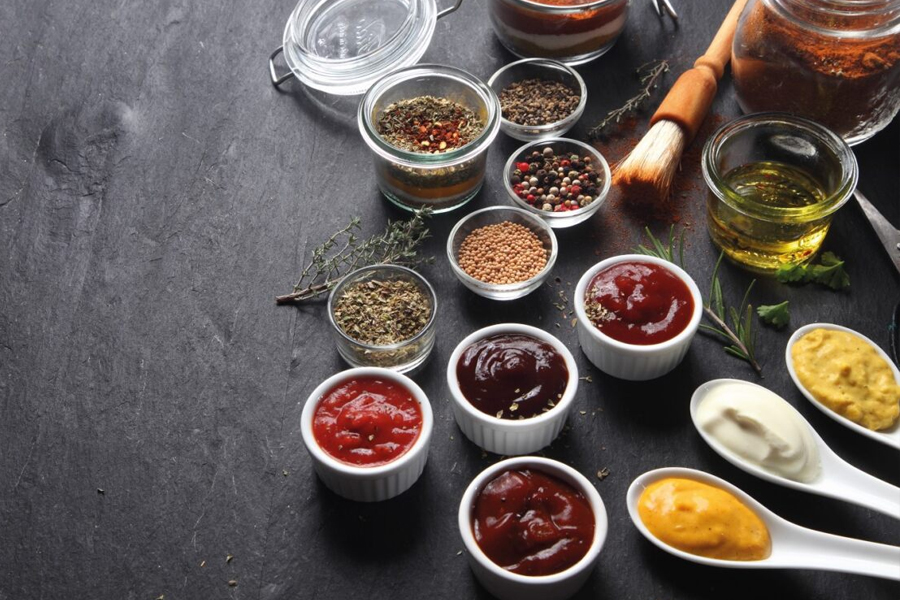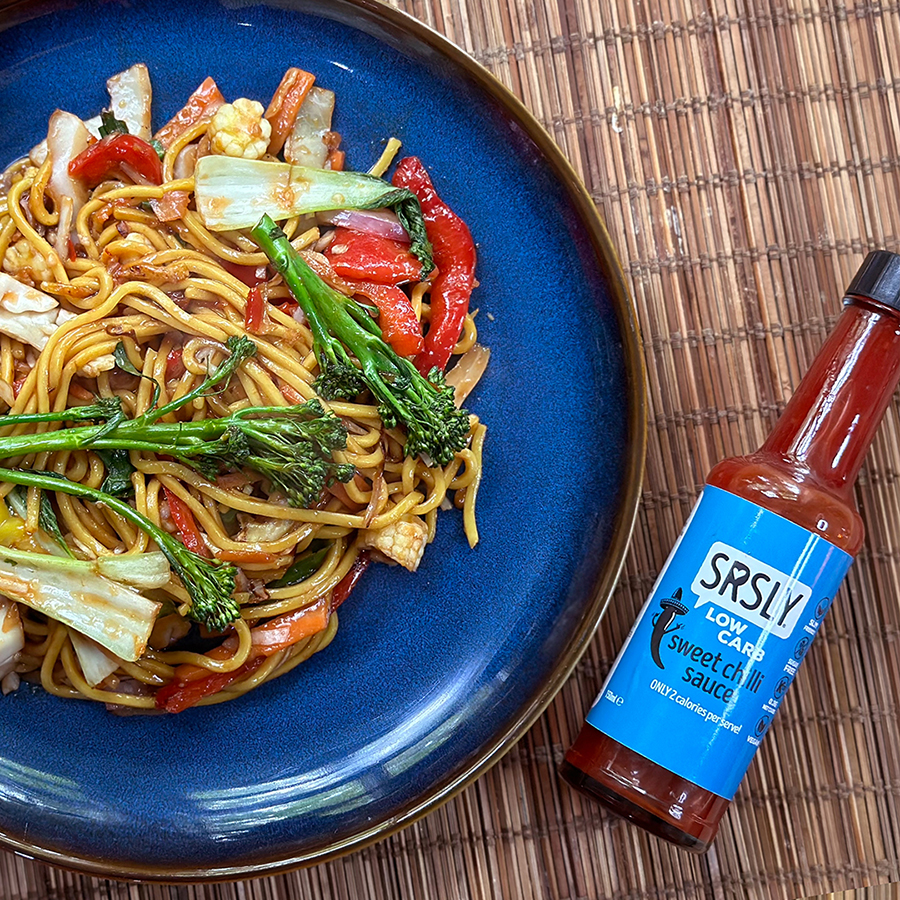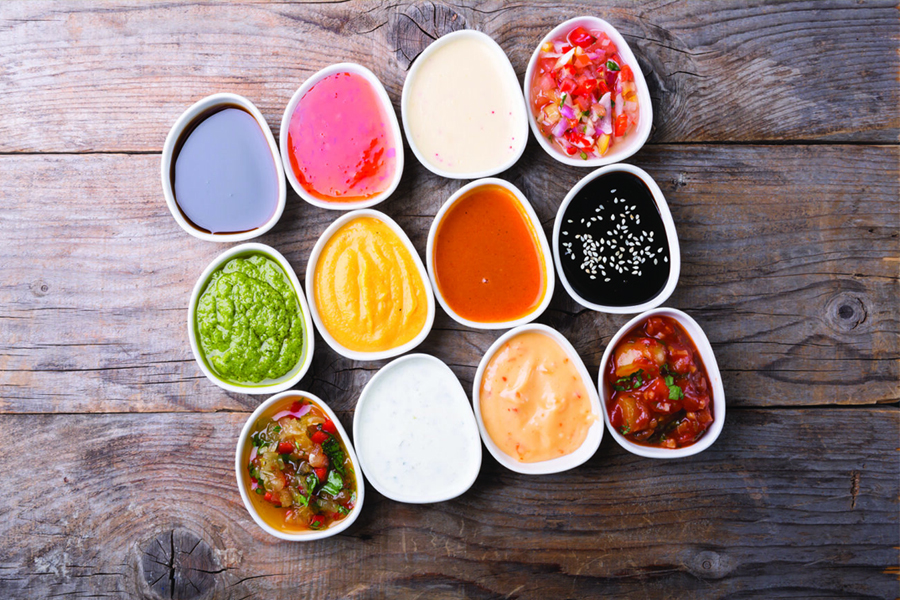They’re a key accompaniment for sandwiches, food to go and so much more. But why aren’t condiments and sauces made with more wholesome ingredients?
The Right Choices
Whether it’s Paul Newman, Ed Sheeran or Heinz behind the product, the condiments and sauces market is simply irresistible. However, with consumers increasingly concerned about sourcing, sustainability and dietary choices, the traditional additions to commercial sandwiches and food to go could well be due a makeover.
Although a seemingly obvious way to bring healthy improvements to the nutritional column, as well as introducing flavours to customers, many of the major condiment suppliers have yet to embrace the idea of rethinking their offering from this fresh perspective. It’s primarily new kids on the block in the consumer sector leading the way. And the eye-watering numbers cannot be ignored.
“Sauces and condiments are staple ingredients in the chef’s pantry today, with sales standing at £767 million [Kantar, 2022],” according to Rachel Shoosmith, Creative Foods’ marketing manager – a business with years of experience, bringing high-quality own label, bespoke and branded products to retail, foodservice, wholesale and b2b customers.
“The hot sauce category has seen volume growth of 6% over the past five years [IRI, Feb 2022]. It’s certainly an area for caterers to focus on.”
But what is also inescapable is Britain’s health crisis, with the third-highest obesity rate in Europe, behind only Malta and Turkey – and almost one in three adults now classified as clinically obese [Institute for Government]. At the heart of the issue are the so-called ultra-processed foods – many a sauce and condiment included – which experts believe are contributing to the problem.
It’s in this vice-like squeeze between government and expert pressure, and consumer taste and desire, that opportunities for new sources for our sauces can be found. There are lessons here, if only visible in the direct-to-consumer sector of the market.

Outside The Box
SRSLY Low Carb offer consumer products focused on ‘wholesome food for every occasion’. But when the founder, Andy Welch, was busy insourcing or outsourcing back- office systems in a previous career path, a forward-thinking retail business of award-winning, high-protein fare wasn’t much of a priority. This all changed in 2019.
“I rarely took a day off and was commuting weekly to Poland for six months before I collapsed on a plane. I’d enjoyed a healthy lifestyle previously, but a combination of things had led to that breaking point.”
Welch’s new direction was inspired by a gap in the marketplace. “I looked at doing an Ironman, but lots of people were often failing on nutrition. Then I came across the work of coach and exercise physiologist, Dan Plews, who was an expert in the science behind low-carb, high-fat diets – effectively ketogenic.” Since 2018, keto has been America’s most popular online search trend, holding the crown for four consecutive years [Google]. It’s only recently been supplanted by veganism.
With Welch dismayed by the additives and fortification commonplace in much of modern bread production, his nascent commercial bakery, SRSLY, developed their low-carb bread – just 3.3g of net carbs per 100g, compared to the 45-55g in standard bread – by thinking outside the box and trialling many iterations before the finished product hit the market.
“The main challenge is convincing other people that it’s a good idea, buying into my singular vision,” remarked Welch, as he talked about the company’s history and recent expansion into the condiments sector.
Growth Drivers
The consumer demand for healthier produce in supermarket aisles is undeniable. The phrase ‘free-from’ is now firmly entrenched in the English lexicon.
“Plant-based options are a huge growth driver in the sauce category, with one in five households looking to reduce meat consumption [Kantar 2021],” said Shoosmith. “Consumers are turning to alternatives to dairy, as well as vegan varieties and veggie-based sauces. Caterers should offer innovative and on-trend vegan flavours, as the UK is seeing a 22% increase in vegan meal consumption and 15% increase in vegetarian meals [Kantar],” concluded Shoosmith.
Low-sugar and sugar free have also long been popular buzzwords for the diet-conscious, particularly those with diabetes concerns. “Condiments were always on our agenda. And so many major products out there are sugar- heavy,” stated Welch. “We’re proud to say that condiments and jams are now a staple of our portfolio. We initially contacted manufacturers and asked about making a jam without the same levels of sugar, and they generally said no. But we’ve found a way.
“We’ve been fortunate to work with an experienced, sauce industry expert – who has helped us establish the low-carb USP. Fortunately, these products also tend to have fewer calories and are higher in fibre, because of the quality of the ingredients,” continued Welch. “Some of this is by accident; some by design. But we’ve created a flavour profile that’s as close to a fine-tasting chilli sauce as possible. Our market sales aren’t as rapid, but they’re certainly consistent. And while you can find us at our website and on Amazon, the global vision for the business is to be the consumer brand of choice in every category.”
Pathway to the NHS
The more competitors in the healthy sauce and condiment market, the better. It’s a product that can generate high emotion. “But there’s lots of marketing around certain sauces and ketchups, for example, saying ‘no added sugar’ – and people think that’s really good,” said Welch.
“However, an education piece for consumers is required, so they understand all the highly processed products that are already stuck in there. Just because nothing has been ‘added’, doesn’t mean there aren’t dangerous levels of sugars already present.”
Perhaps the biggest endorsement of SRSLY’s ambitions is from the NHS: “We’ve been awarded an NHS contract, having applied via their tender process, and it’s in the works. Birmingham Children’s Hospital got in touch a couple of years ago, asking if we could help with the sharing of knowledge of our products – they couldn’t promote them directly, but told inpatients how they were available and good for you. We offer a charitable strand of the business, with discounts for them.
“The other major piece is NHS Supply Chain,” continued Welch. “We spoke to a key person in charge of the procurement process, at the International Food & Drink Event [IFE], and they knew all about what we do. They required products exactly like ours and were interested in us providing everyday goods, with the potential for every single one of their hospitals – and could we also do Scotland? It’s amazingly honourable to be offered such a wonderful opportunity, so watch this space.”

Passion Project
Post-pandemic, appetites for food appear to be coinciding with those wanting to jump on a plane. “Global cuisines are driving trends in sauces and condiments, as consumers look to travel the world through the food they eat.
American-inspired sauces are still popular, including burger sauce and our own Texan BBQ Mop,” said Shoosmith. “We are seeing growth in Asian flavours such as oyster, soy, wasabi, miso, as well as lesser-explored Middle Eastern offerings like Israeli dressings and Toum – a Lebanese garlic sauce.” A Reduced Salt Deluxe Premium BBQ Sauce is also available from Creative Foods, providing yet more evidence of a trend shift.
“Sauces can add excitement on menus, whether that’s in the dish or served as a dip,” said Shoosmith. “As consumer tastes evolve, the hot sauce category has seen volume growth of 6% over the past five years [IRI, February 2022]. In addition, given the rise in remote working, the lunchtime occasion is a key opportunity for sauces and condiments as a way to add value and drive sales.”
But for his unique offering, Welch is well aware that time is off the essence.
“We probably have a window of around three to four years before the big food companies look at low-carb versions of their products. And, unfortunately, government legislation around equivalent sugars and being clear with labelling messages is not happening. Which is why it’s so special when we get wonderful client reviews about what we’re doing – especially through our relationships with the hospitals and how we are changing the lives of people. I’m often left in tears,” concluded Welch.

